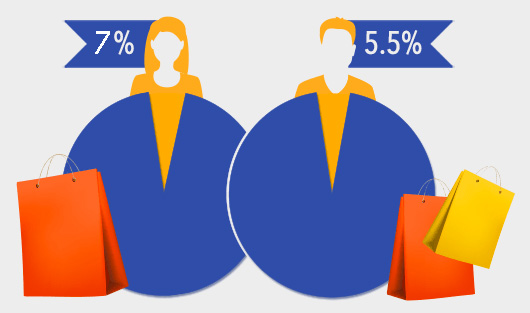 Lo shopping compulsivo (anche detto comportamento di acquisto compulsivo) è una pratica molto diffusa, in progressivo aumento, che spesso rimane trascurata o minimizzata in ambito clinico. Una maggiore conoscenza di questo disturbo è fondamentale per riconoscerlo e capire quando è necessario iniziare una cura. Il disturbo è caratterizzato da preoccupazioni eccessive per l’acquisto di beni materiali (lo shopping), frequenti episodi di acquisto causati da un impulso all’acquisto travolgente, irresistibile e senza apparente senso. Le spese frequenti sono generalmente associate ad altri disturbi psicologici, a problemi sociali, professionali o finanziari gravi. Tra i disturbi psichici associati allo shopping compulsivo si possono citare: i disturbi d’ansia, i disturbi depressivi, il disturbo da accumulo e il disturbo da alimentazione incontrollata. Secondo le stime di prevalenza americane soffrirebbero di questo disturbo il 6% e il 7% della popolazione. I giovani sarebbero più inclini a sviluppare tale disturbo (Müller et al., 2015).
Lo shopping compulsivo (anche detto comportamento di acquisto compulsivo) è una pratica molto diffusa, in progressivo aumento, che spesso rimane trascurata o minimizzata in ambito clinico. Una maggiore conoscenza di questo disturbo è fondamentale per riconoscerlo e capire quando è necessario iniziare una cura. Il disturbo è caratterizzato da preoccupazioni eccessive per l’acquisto di beni materiali (lo shopping), frequenti episodi di acquisto causati da un impulso all’acquisto travolgente, irresistibile e senza apparente senso. Le spese frequenti sono generalmente associate ad altri disturbi psicologici, a problemi sociali, professionali o finanziari gravi. Tra i disturbi psichici associati allo shopping compulsivo si possono citare: i disturbi d’ansia, i disturbi depressivi, il disturbo da accumulo e il disturbo da alimentazione incontrollata. Secondo le stime di prevalenza americane soffrirebbero di questo disturbo il 6% e il 7% della popolazione. I giovani sarebbero più inclini a sviluppare tale disturbo (Müller et al., 2015). Le stime mondiali provenienti da 16 paesi stimano una prevalenza del 4,9%, anche se tali percentuali erano più alte tra gli studenti universitari, soprattutto nelle giovani donne (Maraz et al., 2016). I dati europei indicano un aumento dello shopping compulsivo nella popolazione adulta negli ultimi 20 anni.
Le stime mondiali provenienti da 16 paesi stimano una prevalenza del 4,9%, anche se tali percentuali erano più alte tra gli studenti universitari, soprattutto nelle giovani donne (Maraz et al., 2016). I dati europei indicano un aumento dello shopping compulsivo nella popolazione adulta negli ultimi 20 anni.
La rilevanza di riconoscimento dello shopping compulsivo come disturbo mentale è innegabile a fronte della sua prevalenza stimata e degli effetti sul funzionamento sociale e lavorativo. Ulteriori ricerche sarebbero necessarie data l’eterogeneità degli individui con tale disturbo. Vi è anche la necessità di opzioni di trattamento specifiche e dello sviluppo di strategie di prevenzione (Müller et al., 2015).
 Il video, tratto dal film “I love shopping” di P.J.Hogan (2009), ispirato agli omonimi romanzi di Sophie Kinsella, mostra, in una modalità caricaturale, i comportamenti di una ragazza affetta da shopping compulsivo:
Il video, tratto dal film “I love shopping” di P.J.Hogan (2009), ispirato agli omonimi romanzi di Sophie Kinsella, mostra, in una modalità caricaturale, i comportamenti di una ragazza affetta da shopping compulsivo:
17 soggetti (provenienti da un campione iniziale di 26 individui affetti da shopping compulsivo da almeno un anno) sono stati intervistati e osservati in un periodo temporale di 5 anni. La loro età media era di 44 anni. Dopo 5 anni la maggior parte dei soggetti presentava una stabilità o un aggravamento del disturbo. L’interesse per lo shopping e per la spesa, infatti, era diminuito per 8 soggetti (il 47% del campione), era rimasto lo stesso per 5 soggetti (il 29% del campione) e aumentato per 4 soggetti (il 24% del campione). 11 soggetti (il 65% del campione) hanno riferito di aver tentato di curare il disturbo e 3 (il 18% del campione) hanno riferito di curarsi proprio facendo shopping.
Stimoli favorenti le ricadute erano sensazioni di pressione, eccitazione o tensione nel fare shopping, la noia, emozioni negative come la tristezza, la frustrazione o rabbia, il desiderio di sentimenti positivi come la felicità, potere o l’esaltazione.
Nella ricerca i soggetti con punteggi medi alle scale di valutazione, nate originariamente per indagare sintomi ossessivo-compulsivi (come la Compulsive Buying Scale, versione derivata dalla Yale-Brown Obsessive Compulsive Scale), hanno mostrato un miglioramento generale dei sintomi e sono stati anche meno impulsivi. I soggetti con un disturbo dell’umore associato tendevano ad avere una maggiore severità dello shopping compulsivo (Black et al., 2016).
 L’efficacia della terapia cognitivo-comportamentale di gruppo, adattata per il trattamento dello shopping compulsivo, è stata valutata in varie ricerche. Il trattamento è specificamente finalizzato a interrompere e controllare il comportamento di acquisto problematico, permettendo di acquisire modelli di acquisto salutari, di ristrutturazione dei pensieri disadattivi e dei sentimenti negativi associati allo shopping e all’acquisto, attraverso lo sviluppo di capacità di adattamento sane. Secondo le ricerche scientifiche il miglioramento dei sintomi, ottenuto attraverso la terapia cognitivo-comportamentale, sembrerebbe permanere per almeno 6 mesi. Un basso numero di sedute di psicoterapia e maggiori episodi di accumulo pretrattamento erano predittori significativi per una mancata risposta clinica (Mueller et al., 2008). Nei casi di particolare complessità, nei quali altri disturbi psichici sono associati allo shopping compulsivo, può essere utile associare alla psicoterapia una terapia farmacologica specifica.
L’efficacia della terapia cognitivo-comportamentale di gruppo, adattata per il trattamento dello shopping compulsivo, è stata valutata in varie ricerche. Il trattamento è specificamente finalizzato a interrompere e controllare il comportamento di acquisto problematico, permettendo di acquisire modelli di acquisto salutari, di ristrutturazione dei pensieri disadattivi e dei sentimenti negativi associati allo shopping e all’acquisto, attraverso lo sviluppo di capacità di adattamento sane. Secondo le ricerche scientifiche il miglioramento dei sintomi, ottenuto attraverso la terapia cognitivo-comportamentale, sembrerebbe permanere per almeno 6 mesi. Un basso numero di sedute di psicoterapia e maggiori episodi di accumulo pretrattamento erano predittori significativi per una mancata risposta clinica (Mueller et al., 2008). Nei casi di particolare complessità, nei quali altri disturbi psichici sono associati allo shopping compulsivo, può essere utile associare alla psicoterapia una terapia farmacologica specifica.
Riferimenti:
Black DW et al (2016). Five-year follow-up of people diagnosed with compulsive shopping disorder. Compr Psychiatry. 68: 97-102.
Maraz A et al (2016). The prevalence of compulsive buying: a meta-analysis. Addiction. 111(3): 408-19.
Mueller A et al (2008). A randomized, controlled trial of group cognitive-behavioral therapy for compulsive buying disorder: posttreatment and 6-month follow-up results. J Clin Psychiatry. 69(7): 1131-8.
Müller A et al (2015). Compulsive buying.. Am J Addict. 24(2): 132-7.
Dott.ssa Tiziana Corteccioni
Medico chirurgo, Specialista in Psichiatria, Psicoterapeuta
Medico Psichiatra e Psicoterapeuta ad orientamento clinico cognitivo-comportamentale.
Da Ottobre 2010 collabora con il Centro Ricerche Musicali di Roma nel progetto “Musica Emozioni” rivolto a soggetti con difficoltà sul piano emotivo. E’ coautrice di pubblicazioni scientifiche.
Da Novembre 2013 collabora con l’Associazione di Clinica Cognitiva del Lazio.
Esercita attività come psichiatra e psicoterapeuta presso vari centri clinici a Roma ed a Perugia nei quali si occupa prevalentemente del trattamento farmacologico e psicoterapeutico di disturbi del sonno, depressione, disturbo bipolare, attacchi di panico, fobie, disturbo ossessivo-compulsivo, disturbi alimentari, disturbi di personalità, dipendenze e schizofrenia.
